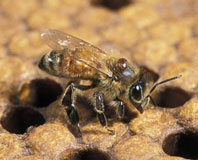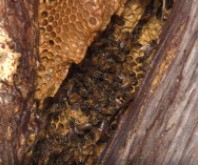Read the latest information on
Foot-and-mouth disease

Mature varroa mite on European honey bee. Photo: Stephen Ausmus, USDA Agricultural Research Service, Bugwood.org
Any threat to bee health in Australia will have significant economic impacts on tree crop industries which depend on the free pollination services they provide.
Australia is currently free of one of the worst pests of bees, the Varroa destructor mite. So when the mite was detected on an incoming ship at the Port of Melbourne at the end of June this year quick action was needed.
Surveillance of hives around the port was increased and to ensure the pest had not spread, a heightened level of surveillance continued for six weeks after the detection.
The incident is a reminder of the importance of keeping varroa out of Australia to maintain a healthy bee population.
Varroa mite is now found in all other countries in the world with major beekeeping industries.
Professor Saul Cunningham from the Fenner School of Environment and Society at the Australian National University said that wherever you look you find wild pollinators, including unmanaged honey bees, in the system.
“There are native bees – about 3000 species of native bees in Australia – and then there’s other insects like flies and beetles that can visit flowers and play a role in pollination,” Saul said.

If varroa becomes established in Australia, feral or unmanaged colonies of honey bees like this will no longer be around to provide free pollination services for growers
With most feral bees gone, and no longer providing a free crop pollination service, growers are likely to make more use of commercial pollination services.
The need to control varroa would require a shift in thinking and a change in beekeeping practices. Checking hives for the number and presence of varroa and applying treatments to control the pest would become common. Beekeeping costs would likely increase with more frequent visits to hives and the added costs of treatments.
The pollination rate is determined by the number of boxes, the amount of brood, and the number and health of the bees.
“As a general rule, the more evenly the hives are placed in a crop, the better the distribution of foraging bees, so bring the bees to the trees,” Saul advised.
A contract between a grower and a beekeeper can be very useful to make sure there are no misunderstandings about what a beekeeper will provide and the responsibilities of the grower while the bees are working in the crop.
A standard contract might state the number and standard of hives, when and where they will be placed in the crop, communication between the parties, fees, payments and pesticide use.
For more information about pollination go to the BeeAware website at beeaware.org.au
If you see anything unusual on your bees call the Exotic Plant Pest Hotline on 1800 084 881.
“Those insects are playing a bigger role than we probably appreciated. And they’re doing it for free.”
If varroa became established in Australia, based on overseas experience, we can expect to lose both unmanaged and managed honey bee colonies.